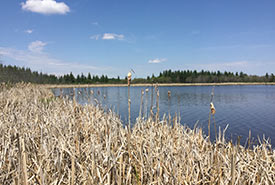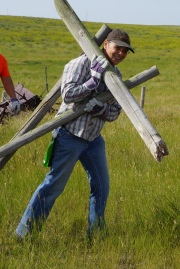Granny cannot walk on water

Wetlands at Reiser property, AB (Photo by NCC)
Early this September, I participated in a Nature Conservancy of Canada (NCC) Conservation Volunteers (CV) event at the Reiser property, located approximately 115 kilometres southwest of Edmonton. I knew it would be a challenge, in part because of the mile-long hike through rough tall grass terrain just to reach the property, but as well because we were tasked with the removal of page wire placed within a fen, a marsh and a wetland. If you have ever removed page wire then you understand that dirt, moss, grass, willows and trees grow through the wires, making it a battle of strength and perseverance. It becomes a game of tug of war; nature versus human.
The purpose of this event was to prevent waterfowl and mammals, such as moose and deer, from becoming snared or entangled in the wire. It is a long, hard battle for an animal to try and free itself from wire. Entanglement may result in the animal breaking bones, bleeding or starving to death. It is a harsh way to die. So whenever I see NCC has an event for the removal of wire, I am empowered to prevent such needless suffering.
I don’t know how it occurred, but when we arrived at the wetland, I suddenly found myself leading the group through the marsh. Peering through the six-foot-tall cattails, I could see we were fast approaching the pond. Suddenly, I felt my boot sink as the marsh’s greenery undulated beneath my foot.
But I trekked onward; after all, I had my rubber boots on, and we were talking marsh; so water, although present, shouldn’t be that deep. A fool that I was for thinking this, for with the very next step, my leg just kept sinking. Flinging my body down and spreading my arms outward, like you would do on cracking ice, I dispersed my body weight over numerous cattails, managing to stop my descent at the hip.
Happy to have stopped, I quickly realized I had not touched bottom. I warned others who wished to assist to stay back. Gradually I worked my leg free, holding on to the top of my water- and scum-filled boot. Once my leg was freed, I lifted my leg to drain the water. Dumb mistake number two, as the water took the path of least resistance, up the inside of my pant leg. I was, however, grateful to discover that the cattails supported me as I walked back off the marsh.
Life has taught me that there are far worse things than walking around with a wet foot, so when concerned individuals offered me their spare dry socks, I turned them down. As a child I had spent many hours running around in wet rubber boots, because I had tested the puddles’ depths. There were numerous times, after a bout of having “good…clean…fun,” that my mother greeted me at the back door of the house with the garden hose in her hand. It didn’t kill me; it taught me life lessons.
Life experiences are the foundation for the School of Hard Knocks. Often times, at least in my life, life’s lessons have involved our natural environment. Just like my experience with “walking on water”: I should have listened when the sway underfoot warned me.
So this brings me to the bigger picture:
According to the Institute of Wetlands and Waterfowl Research, close to 65 per cent of Alberta’s the sloughs/marsh wetlands in settled areas “no longer exist.”
But wetlands are our natural environment’s circulatory system. Just as our blood carries nutrients and oxygen around our body, so too do wetlands. Wetlands provide a necessity for all life forms, including humans. So to destroy, cut off or impair their ability to circulate is similar to putting a tourniquet on our leg or arm. Loss of blood flow to an area prevents growth and healing. When the tourniquet is not managed properly, it can result in the death of tissue and loss of use of parts of our anatomy.
So, too, it is for nature. The loss or mismanagement of wetlands means a loss of health, not only for wildlife, but as well for humans. It is this fundamental principle that supports the need for humans to recognize that our health is directly linked to the health of our natural environment, and theirs to human activities. Humans and our natural environment are codependent; we are interrelated. What we do to our natural spaces/species we ultimately do to ourselves. As grandfather would say, “You reap what you sow.”
So no, Granny cannot walk on water, but I sure as the heck can do, whatever I can to support the necessity for all species’ health and well-being, and that means ensuring there are areas set aside and maintained; unimpeded by human activities. I'm happy to say that today's task of removing an obstinate hazard from grueling terrain was a success. Now multiple wildlife species may flow freely.


